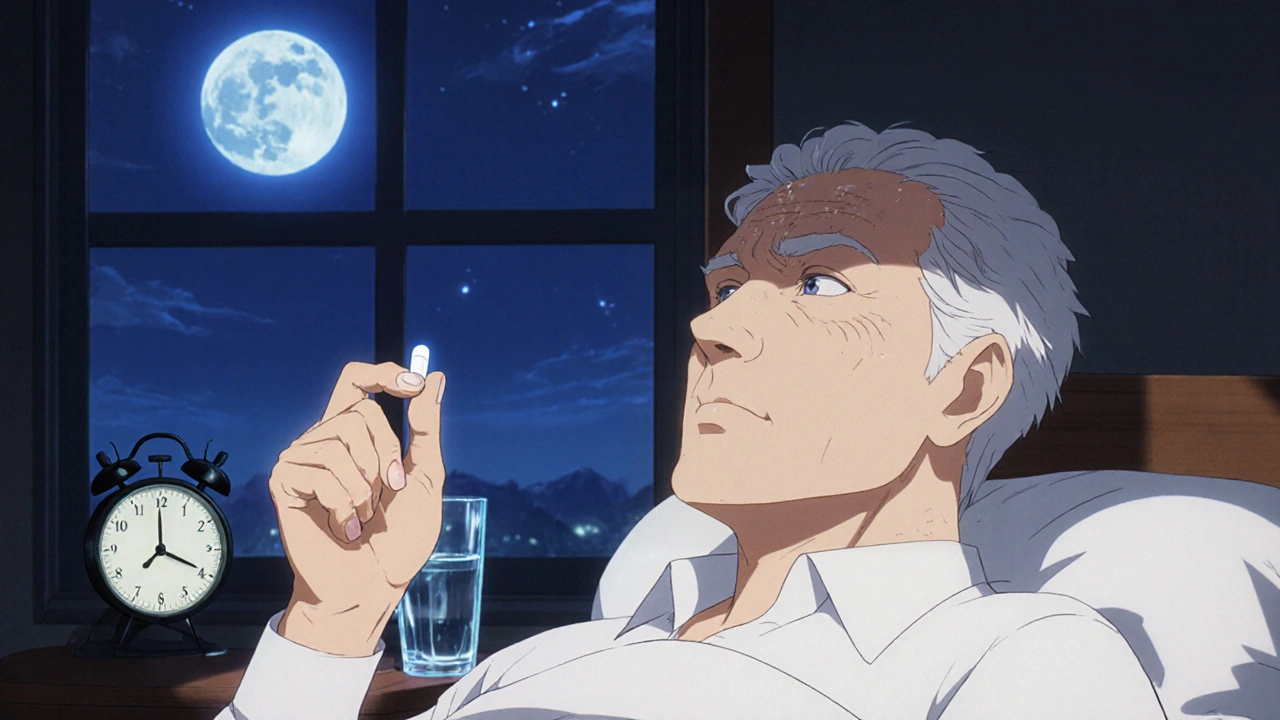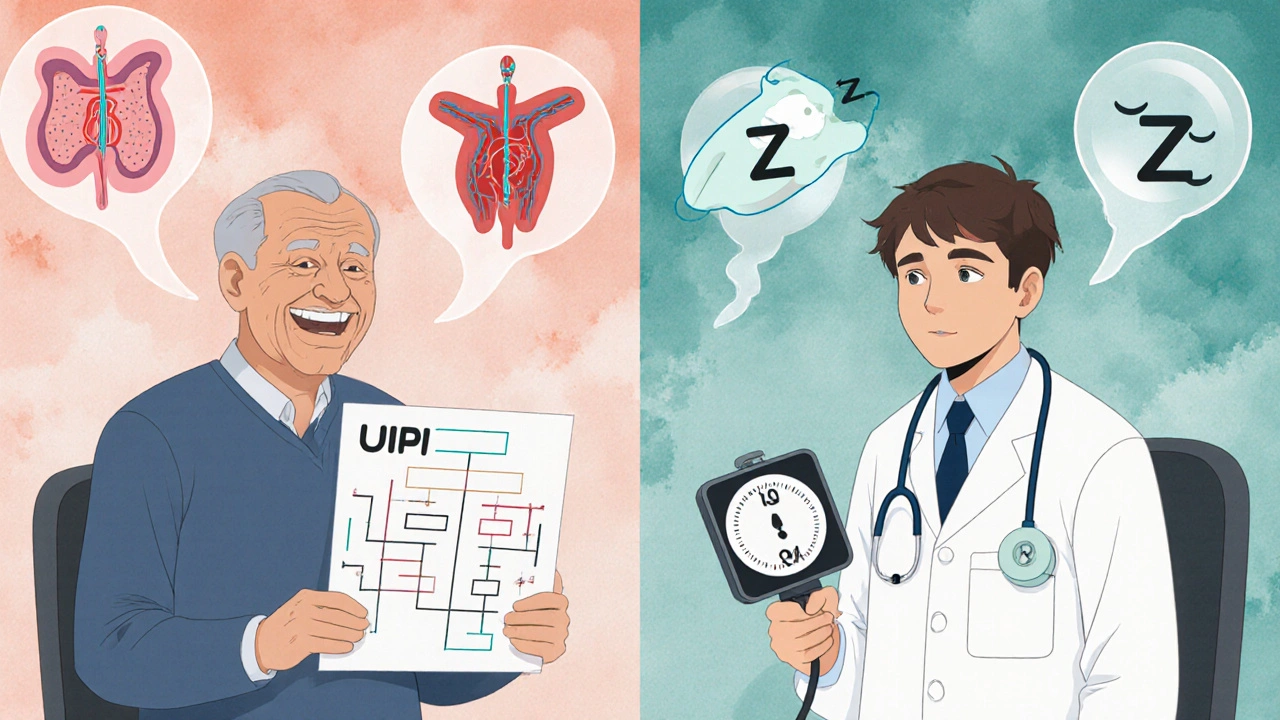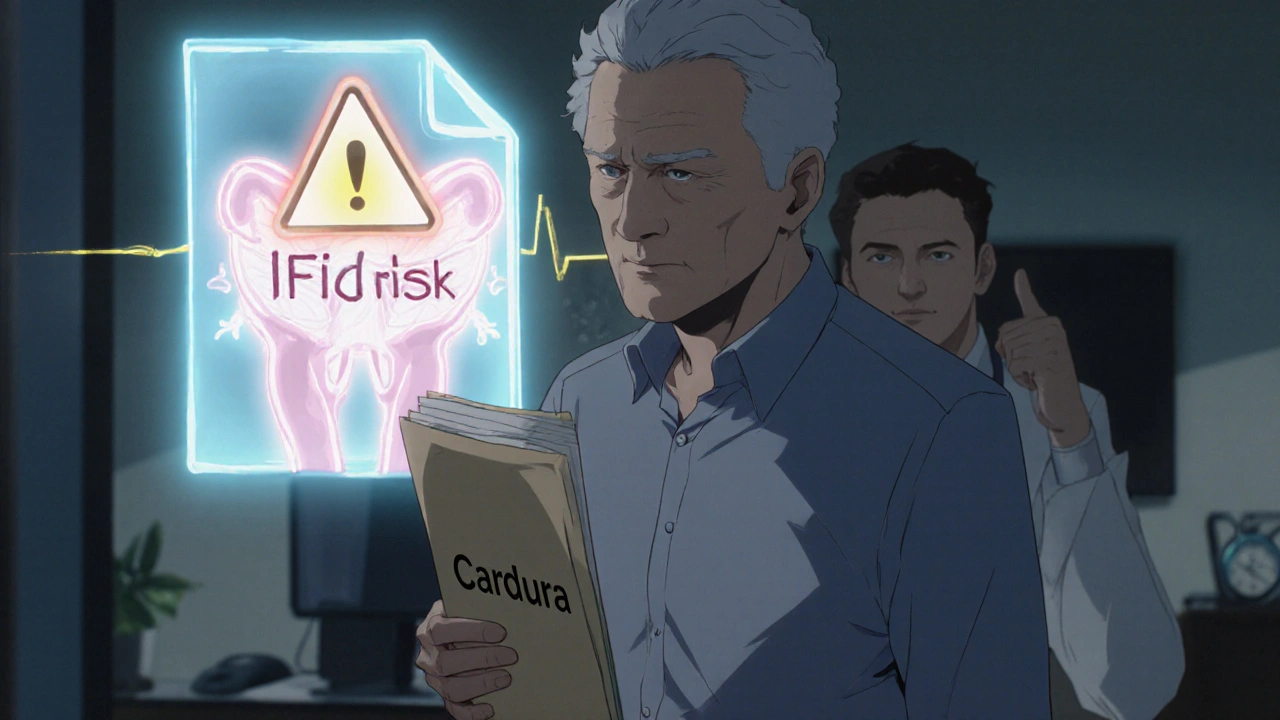Cardura: What It Is, How It Works, and When It's Prescribed
 Nov, 18 2025
Nov, 18 2025
Cardura is the brand name for doxazosin, a medication used primarily to treat high blood pressure and symptoms of an enlarged prostate. It doesn’t cure these conditions, but it helps manage them so you can feel better and reduce long-term risks like heart attack or stroke. If you’ve been prescribed Cardura, you’re probably wondering how it works, what to expect, and whether it’s right for you.
How Cardura Works in Your Body
Cardura belongs to a class of drugs called alpha blockers. These drugs relax certain muscles in your blood vessels and prostate. When blood vessels relax, blood flows more easily, which lowers your blood pressure. When the muscles around the prostate relax, it eases pressure on the urethra, helping you urinate more freely.
Unlike some blood pressure meds that slow your heart rate or remove fluid from your body, Cardura works directly on the nerves that control muscle tension. This makes it especially useful for men who have both high blood pressure and trouble urinating due to an enlarged prostate - a common issue as men get older.
It starts working within hours, but it can take up to two weeks for your blood pressure to stabilize. For prostate symptoms, improvement often shows up in the first week. The key is consistency - skipping doses can undo the progress.
Who Gets Prescribed Cardura?
Cardura is mainly prescribed for two groups:
- People with hypertension (high blood pressure), especially if other medications haven’t worked well or caused side effects
- Men with benign prostatic hyperplasia (BPH), where the prostate gland grows larger and blocks urine flow
It’s not usually the first choice for high blood pressure. Doctors often try diuretics or ACE inhibitors first. But if you’re a man over 50 with both conditions, Cardura becomes a practical option because it handles both at once.
It’s also sometimes used off-label for conditions like Raynaud’s phenomenon or certain types of kidney stones, but these uses are less common and always under specialist supervision.
Dosing and How to Take It
Cardura comes in tablet form, with strengths of 1 mg, 2 mg, 4 mg, and 8 mg. The starting dose is almost always 1 mg once daily, usually taken at bedtime. Why bedtime? Because the first dose can cause a sudden drop in blood pressure, leading to dizziness or fainting - especially when standing up. Taking it at night reduces the risk of falling or getting hurt.
Your doctor will slowly increase the dose every week or two, depending on how you respond. Most people end up on 2 mg to 8 mg per day. Never increase your dose on your own. Going too fast can cause dangerous drops in blood pressure.
You can take Cardura with or without food, but be consistent. If you take it with meals one day and on an empty stomach the next, your blood pressure may fluctuate more than usual.
Common Side Effects and What to Watch For
Most people tolerate Cardura well, but side effects are common - especially when you start or increase the dose.
- Dizziness or lightheadedness (most common, especially when standing)
- Fatigue or feeling unusually tired
- Headache
- Nasal congestion or runny nose
- Swelling in the ankles or feet
The first-dose effect is real. About 1 in 5 people feel dizzy or faint after their first tablet. That’s why doctors always start low and tell you to take it at night. If you feel dizzy, sit or lie down right away. Don’t drive or operate machinery until you know how your body reacts.
Less common but serious side effects include:
- Fast or irregular heartbeat
- Severe dizziness or fainting
- Signs of an allergic reaction - rash, swelling of the face or throat, trouble breathing
If any of these happen, stop taking Cardura and get medical help immediately.

What You Should Avoid
Some things can make Cardura less safe or less effective.
- Alcohol: It can worsen dizziness and lower your blood pressure even more.
- Other blood pressure meds: Taking Cardura with other drugs that lower blood pressure - like sildenafil (Viagra) or tadalafil (Cialis) - can cause a dangerous drop in pressure. Always tell your doctor what else you’re taking.
- Over-the-counter cold remedies: Many contain decongestants like pseudoephedrine, which can raise your blood pressure and counteract Cardura.
Also, don’t stop Cardura suddenly. Even if you feel fine, stopping it abruptly can cause your blood pressure to spike back up, sometimes dangerously.
How Cardura Compares to Other Options
There are several alternatives for treating high blood pressure and BPH. Here’s how Cardura stacks up:
| Medication | Class | Best For | Common Side Effects | First-Dose Risk |
|---|---|---|---|---|
| Cardura (doxazosin) | Alpha blocker | Men with both high blood pressure and BPH | Dizziness, fatigue, swelling | High |
| Tamsulosin (Flomax) | Alpha blocker | BPH only - less effect on blood pressure | Dizziness, retrograde ejaculation | Moderate |
| Amlodipine | Calcium channel blocker | High blood pressure | Swelling in legs, headache | Low |
| Finasteride (Proscar) | 5-alpha reductase inhibitor | Long-term prostate shrinkage | Lower sex drive, erectile dysfunction | None |
Tamsulosin is often preferred for BPH alone because it’s less likely to cause low blood pressure. But if you need to treat both conditions, Cardura is more efficient. Amlodipine is a solid choice for blood pressure without prostate concerns. Finasteride works slowly but can shrink the prostate over time - often used with an alpha blocker for better results.
Long-Term Use and Monitoring
Cardura is usually taken long-term. Many people stay on it for years. Regular check-ups are important. Your doctor will monitor your blood pressure and may check kidney function or prostate size over time.
One thing to know: Cardura can cause a rare but serious condition called intraoperative floppy iris syndrome (IFIS), which happens during eye surgery. If you ever need cataract surgery, tell your eye surgeon you’re taking Cardura - even if you’ve been off it for months. They’ll adjust their technique to avoid complications.
Also, while Cardura helps control symptoms, it doesn’t stop the prostate from growing. If your symptoms get worse over time, your doctor may add another medication or consider other treatments.

What to Do If You Miss a Dose
If you forget a dose, take it as soon as you remember - unless it’s close to your next dose. Then skip the missed one. Never double up. Taking two doses at once can cause a sudden drop in blood pressure, which is dangerous.
Set a daily alarm or use a pill organizer. Missing doses is one of the main reasons people’s blood pressure stays high even when they’re on medication.
When Cardura Might Not Be Right for You
Cardura isn’t safe for everyone. Avoid it if you:
- Have a known allergy to doxazosin or similar drugs
- Have severe liver disease - your body can’t process it properly
- Are taking certain medications for erectile dysfunction (like Viagra or Cialis) without your doctor’s approval
- Are pregnant or breastfeeding - it’s not studied enough in these groups
If you’re over 65, your doctor will likely start you on an even lower dose. Older adults are more sensitive to blood pressure drops and are at higher risk of falls.
Real-Life Impact: What Patients Say
Many men report big improvements. One 68-year-old from Johannesburg said, "I was waking up five times a night to pee. After two weeks on Cardura, I slept through. My blood pressure dropped from 160/95 to 128/80. I didn’t even notice the side effects - I just felt better."
Another woman in Cape Town, 59, was prescribed Cardura for high blood pressure and noticed her headaches disappeared. "I was scared at first because I read about dizziness. But I took it at night, and it was fine. Now I’ve been on it for three years."
Not everyone has a smooth experience. Some report fatigue or swelling. A few stop because of dizziness. But most who stick with it say the benefits outweigh the downsides.
Next Steps If You’re on Cardura
- Take it exactly as prescribed - no skipping, no doubling up
- Stand up slowly, especially in the morning
- Keep all follow-up appointments
- Keep a list of all other meds, including supplements
- Let your eye doctor know you’re on Cardura before any surgery
- Call your doctor if you feel faint, have chest pain, or notice swelling in your legs
Cardura isn’t a miracle drug, but for millions of people, it’s a simple, effective way to manage two common problems at once. With the right dose and awareness of side effects, it can make a real difference in your daily life.
Is Cardura the same as Flomax?
No. Cardura (doxazosin) and Flomax (tamsulosin) are both alpha blockers, but they work differently. Cardura affects blood pressure and the prostate, while Flomax is designed mainly for prostate symptoms with less impact on blood pressure. Flomax is often preferred for men who only have BPH, while Cardura is better if you also have high blood pressure.
Can I take Cardura with Viagra?
Not without your doctor’s approval. Both Cardura and Viagra lower blood pressure. Taking them together can cause a dangerous drop in blood pressure, leading to dizziness, fainting, or even a heart attack. If you need both, your doctor may adjust the doses or suggest alternatives.
How long does it take for Cardura to work?
You might notice lower blood pressure within hours, but it can take 1-2 weeks to reach full effect. For prostate symptoms like frequent urination, many men feel better within a week. Don’t stop taking it if you don’t see instant results.
Does Cardura cause weight gain?
Weight gain isn’t a common side effect of Cardura. Some people notice swelling in their ankles or feet, which can feel like weight gain, but it’s fluid retention, not fat. If you gain weight quickly or have trouble breathing, contact your doctor - it could be a sign of heart issues.
Can I drink alcohol while taking Cardura?
It’s best to avoid alcohol, especially when you first start or increase your dose. Alcohol makes dizziness and low blood pressure worse, increasing your risk of falling. If you do drink, do so in very small amounts and only after you know how Cardura affects you.
What happens if I stop taking Cardura suddenly?
Stopping suddenly can cause your blood pressure to spike back up quickly, which increases your risk of stroke or heart attack. Always talk to your doctor before stopping. They may taper your dose slowly to avoid rebound effects.

Nonie Rebollido
November 18, 2025 AT 09:27Agha Nugraha
November 18, 2025 AT 21:57Andy Smith
November 18, 2025 AT 22:00Rekha Tiwari
November 20, 2025 AT 13:43John Villamayor
November 21, 2025 AT 10:35Jenna Hobbs
November 21, 2025 AT 13:01Ophelia Q
November 23, 2025 AT 10:10Elliott Jackson
November 23, 2025 AT 19:40McKayla Carda
November 25, 2025 AT 12:35Christopher Ramsbottom-Isherwood
November 26, 2025 AT 18:37Stacy Reed
November 28, 2025 AT 14:30Robert Gallagher
November 30, 2025 AT 10:17